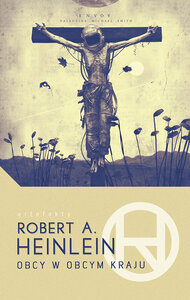Take a photo of a barcode or cover
It seems to be a love it/hate it book. Sadly, I'm not sure which side pick.
While it wasn't completely offensive by the standards of its time, by today's, most definitely. But there was enough in there to make you think and scratch your head.
Either way, I can now say I have read it.
While it wasn't completely offensive by the standards of its time, by today's, most definitely. But there was enough in there to make you think and scratch your head.
Either way, I can now say I have read it.
challenging
medium-paced
Plot or Character Driven:
Character
Strong character development:
Complicated
Diverse cast of characters:
No
If Robert Heinlein were still alive, I'd mail this dog to him and demand a refund. I'm stuck trying to figure out exactly why though.
Is it because the book reeks of free-love-as-a-solution-to-world-issues, but does so through dialog that could have been lifted from the 60s equivalent of Friends, complete with all the racism, sexism, and homophobia that entails?
Is it because the rest of the book is filled with a "super intelligent narrator" and a "naive" counterpart, like a socratic dialog?
It is because somewhere between a Ménage à trois with an elderly woman and group mental possession of lady doing squat thrusts in the cucumber patch (read:bonin'), Heinlein's characteristic fascination with with weird and incestuous sex is impossible to ignore?
Or is it because the guy name drops Rodin sculptures and completely irrelevant book titles (Sick Nietzsche reference, bro) but can't actually engage the reader with the philosophical/linguistic material that is the core of the book's speculative sci-fi-ness?
I donno, but I'm not reading anymore of his stuff. He might be foundational to scifi, but I almost bailed halfway through what the cover calls "The most famous science fiction novel ever written" because it's pedantic, the dialog is pedestrian at best, and it's not fun.
Spoiler
Is it because reading Heinlein means that you have to try and fit his books into his lifelong shift from socialism to libertarianism to authoritarianism?Is it because the book reeks of free-love-as-a-solution-to-world-issues, but does so through dialog that could have been lifted from the 60s equivalent of Friends, complete with all the racism, sexism, and homophobia that entails?
Is it because the rest of the book is filled with a "super intelligent narrator" and a "naive" counterpart, like a socratic dialog?
It is because somewhere between a Ménage à trois with an elderly woman and group mental possession of lady doing squat thrusts in the cucumber patch (read:bonin'), Heinlein's characteristic fascination with with weird and incestuous sex is impossible to ignore?
Or is it because the guy name drops Rodin sculptures and completely irrelevant book titles (Sick Nietzsche reference, bro) but can't actually engage the reader with the philosophical/linguistic material that is the core of the book's speculative sci-fi-ness?
I donno, but I'm not reading anymore of his stuff. He might be foundational to scifi, but I almost bailed halfway through what the cover calls "The most famous science fiction novel ever written" because it's pedantic, the dialog is pedestrian at best, and it's not fun.
adventurous
lighthearted
mysterious
fast-paced
Strong character development:
Yes
Loveable characters:
Yes
Flaws of characters a main focus:
No
Moderate: Sexual content
I wasnt sure I would like this since I am not a science fiction fan but as soon as I popped disc 1 in I was hooked. Great story, great book. Highly Recommended
The first half of the book? Loved it. It kept me fascinated at the idea of a human raised among aliens & how difficult it would be for that human to adjust to life on Earth.
The 2nd half? Hated it. He lost me first with his "9 out of 10 times a girl gets raped, it's partly her fault", then the strong theme of homosexuality being either non-existent or downright wrong. I'm no prude, but the whole back half of the book was nothing more than an orgy of free love & religion, with Michael being the perfect lover, of course - to the extent that my eyes just glazed over.
I normally can overlook attitudes such as these when reading stories written in earlier times... but 1961 wasn't THAT far back. It just smacked as some rant of Heinlein's about religion & sexuality, not a "real" sci fi story. SO disappointing.
The 2nd half? Hated it. He lost me first with his "9 out of 10 times a girl gets raped, it's partly her fault", then the strong theme of homosexuality being either non-existent or downright wrong. I'm no prude, but the whole back half of the book was nothing more than an orgy of free love & religion, with Michael being the perfect lover, of course - to the extent that my eyes just glazed over.
I normally can overlook attitudes such as these when reading stories written in earlier times... but 1961 wasn't THAT far back. It just smacked as some rant of Heinlein's about religion & sexuality, not a "real" sci fi story. SO disappointing.
This is the first Heinlein book I've read, and I definitely plan to read more. Stranger in a Strange Land is an unusual book - it evoked a range of emotions and moods from me, but all the while, I was compelled to keep reading. I'm still not sure what I think about the ending.
The story centers around "The Man From Mars," a child born to astronauts during a trip to Mars, and the sole survivor of their group. He is raised by Martians and then "discovered" about 20 years later when another crew from Earth arrives. He is brought back to Earth where he essentially undergoes a rapid childhood because the entire experience of being human is so alien to him that he has to be socialized entirely as an infant would. Due to the circumstances of his birth and his parentage, he also inherits a massive fortune. His wealth, along with skills he possesses because he was raised by Martians, make him a threat to political, religious, legal, cultural, and social institutions.
The first half or so of the book centers around his "childhood" on Earth and the second half or so deals with his adventures once he is socialized enough to move freely throughout society. The last quarter of the book largely focuses on a spiritual movement that he founds and the (mostly negative) reactions to it. There is a sizable cast of supporting characters, most of whom are transformed in some major way through their interaction with the Man from Mars.
Like any great work of speculative fiction, reading Stranger in a Strange Land mostly encourages more thoughtfulness. Heinlein has a way of drawing you in and keeping you engaged. You can tell it was written during a time when social mores were changing and it wasn't exactly clear which direction they would take. I've heard this book described as a satire, and like most great satirical works, it isn't necessarily "funny." I recommend for anyone who enjoys speculative fiction or a reader that is interested in exploring "the big questions" of philosophy and religion through fiction.
The story centers around "The Man From Mars," a child born to astronauts during a trip to Mars, and the sole survivor of their group. He is raised by Martians and then "discovered" about 20 years later when another crew from Earth arrives. He is brought back to Earth where he essentially undergoes a rapid childhood because the entire experience of being human is so alien to him that he has to be socialized entirely as an infant would. Due to the circumstances of his birth and his parentage, he also inherits a massive fortune. His wealth, along with skills he possesses because he was raised by Martians, make him a threat to political, religious, legal, cultural, and social institutions.
The first half or so of the book centers around his "childhood" on Earth and the second half or so deals with his adventures once he is socialized enough to move freely throughout society. The last quarter of the book largely focuses on a spiritual movement that he founds and the (mostly negative) reactions to it. There is a sizable cast of supporting characters, most of whom are transformed in some major way through their interaction with the Man from Mars.
Like any great work of speculative fiction, reading Stranger in a Strange Land mostly encourages more thoughtfulness. Heinlein has a way of drawing you in and keeping you engaged. You can tell it was written during a time when social mores were changing and it wasn't exactly clear which direction they would take. I've heard this book described as a satire, and like most great satirical works, it isn't necessarily "funny." I recommend for anyone who enjoys speculative fiction or a reader that is interested in exploring "the big questions" of philosophy and religion through fiction.
informative
reflective
slow-paced
Plot or Character Driven:
A mix
Strong character development:
Yes
Loveable characters:
Complicated
Diverse cast of characters:
Yes
Flaws of characters a main focus:
Complicated
I've read most of Heinlein's juveniles and greatly enjoyed them, but here his blatant misogyny is on full display and I just cannot do it. 'Greatest sci-fi novel ever published' or not, I'm taking my time and attention elsewhere, where I won't be full-body cringing every other sentence.




